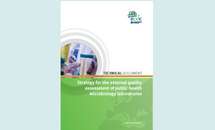Strategy for the external quality assessment of public health microbiology laboratories
ECDC’s Microbiology Coordination Section developed a multi-disease ECDC’s strategy for cost-efficient design and management of ECDC EQAs.
ECDC does not operate its own laboratories; instead, the Centre opted for a network approach and relies upon the microbiological capacity and capability in EU/EEA Member States. ECDC commissions and supports EQA schemes across public health microbiology laboratories in the EU/EEA countries to: verify the quality and comparability of surveillance data reported at EU/EEA level; and to support threat detection capabilities for emerging and epidemic diseases or antimicrobial resistance.
Executive summary
Over the last seven years, the European Centre for Disease Prevention and Control (ECDC) supported over 100 external quality assessment (EQA) exercises.
These EQAs were managed by ECDC’s disease networks to strengthen the contributions of laboratories to public health disease surveillance and threat detection. ECDC EQAs are much valued by participants and stakeholders as a capacity support activity. However, the EQA schemes face strong competition over limited resources because of new laboratory technologies, most notably whole genome sequencing. But this also offers new opportunities. A review of past EQA exercise processes and publication outputs has already identified areas for further improvement.
In keeping with the ECDC Public Health Microbiology Vision and Strategy 2018 ̶ 2022 and the strategic microbiology support objectives of the Single Programming Document 2017 ̶ 2020, ECDC’s Microbiology Coordination Section developed a multi-disease ECDC’s strategy for cost-efficient design and management of ECDC EQAs. This strategy was developed in consultation with the National Microbiology Focal Points, ECDC EQA contract managers and the Joint Microbiology and Surveillance Steering Committee. The strategy outlines the priority areas to be considered to fulfil the following vision: By 2020, ECDC-supported EQAs will help improve and maintain high quality and comparability of key laboratory surveillance data reported at the European level and foster capabilities to detect emerging and epidemic diseases or drug resistance threats across EU Member States.
To translate the EQA vision into action, the strategy focuses on four priorities:
- Consolidated EQA schemes with better quality and higher efficiency
- Enhanced availability and impact of EQA data EQAs oriented towards higher laboratory capacity
- Monitoring the usefulness to participants.
These priorities are supported by ten objectives and their respective indicators and targets. In addition, criteria for prioritising the scope of future EQAs were defined to address new technical developments in the field of molecular diagnostics and genomic surveillance within ECDC’s budget limitations, while safeguarding the EU public health value of ECDC EQAs. In 2017, the Microbiology Coordination Section tested the implementation of this strategy based on a review of 2016 EQA schemes/reports to determine the baseline for cost-efficient management of ECDC EQAs. From 2018 onwards, the Microbiology Coordination Section will collect all data relevant of EQA schemes conducted in the previous year and monitor progress towards the strategic targets of each scheme. This information will be reported back to the EQA contract managers in the disease programmes. A performance analysis of EQA exercises and of specific EQA schemes will be shared with the National Focal Points for Microbiology in the annual ECDC Microbiology Activities Report. Starting in 2019, an ECDC microbiology support performance indicator summarising the participants’ feedback on the practical benefits of their EQA participation with be published in the Director’s Annual Report.






